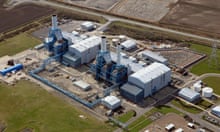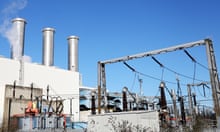Drax has received permission from the government to fit carbon capture technology to its wood-burning power plant, in a project that could cost bill-payers more than £40bn.
The energy secretary, Claire Coutinho, on Tuesday approved the project to convert two of its biomass units to use the technology.
Analysts have predicted that the revamp of the North Yorkshire site could be one of the most expensive energy projects in the world.
The project could add about £1.7bn to energy bills every year if the company acts on plans to fit all four of its biomass units with carbon capture technology, or a total of more than £43bn, according to Ember, a climate thinktank.
In addition, the government is expected within days to extend a lucrative bill-payer-backed subsidy scheme that last year paid Drax more than £600m to burn trees for electricity until the end of the decade.
The decision is likely to anger environmentalists, who have campaigned against burning imported wood pellets and have opposed the multi-billion-pound subsidies paid to Drax over the past 12 years.
The planning decision said the project would “make a meaningful contribution” to the urgent need for carbon capture storage infrastructure to support the government’s net zero ambitions. A separate decision about its subsidy payments will follow before 2027.
Will Gardiner, Drax’s chief executive, said the planning approval “demonstrates both the continued role that Drax power station has in delivering UK energy security and the critical role it could have in delivering large-scale carbon dioxide removals to meet net zero targets”.
A report commissioned by Drax has claimed that adding carbon capture to its biomass power units could save the UK economy up to £15bn between 2030 and 2050 when compared to other, more complex carbon reduction measures using biomass.
Phil MacDonald, the chief operating officer at Ember, said the report ignored the “immediate real costs” of building the plant, which are likely to fall to taxpayers or energy users.
“Over 20 years, this could make Drax’s BECCS plans one of the most expensive energy projects in the world, funded from bill-payers’ pockets,” MacDonald said.
after newsletter promotion
Drax has argued that burning biomass is carbon neutral because regrowing sustainable forests absorbs similar amounts of carbon dioxide as burning the wood in a power plant. Using biomass with carbon capture, known as BECCS, would be create the world’s first “carbon negative power station”, according to Drax.
The claims have been challenged by scientists and climate experts. The company’s green claims are also being scrutinised by the energy regulator, Ofgem, and the National Audit Office, which are undertaking separate investigations into the sustainability criteria of the government’s biomass strategy after fierce criticism by green groups.
A government spokesperson said Ember’s estimates were “entirely speculative” as no decisions about the plant’s carbon capture technology, or additional subsidy, had yet been made.
“Any potential support awarded to Drax would be subject to a value for money and affordability assessment and subsidy control considerations – ensuring that any tax- and bill-payer money is spent wisely,” the spokesperson said.









